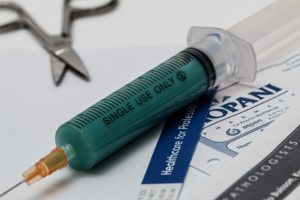 Over the past decade, vaccines have been unjustly tossed into the national spotlight. All of a sudden, people are questioning the modern miracle of science and medicine. First, it is important to clear the air. Vaccines are safe. They are necessary. People should absolutely vaccinate their children unless their kids are either too young or allergic to the ingredients. The effects of not vaccinating children are profound. Despite the scientific consensus that people should vaccinate their children, an increasing number of people are refusing to do so. It is important to examine how vaccinations work.
Over the past decade, vaccines have been unjustly tossed into the national spotlight. All of a sudden, people are questioning the modern miracle of science and medicine. First, it is important to clear the air. Vaccines are safe. They are necessary. People should absolutely vaccinate their children unless their kids are either too young or allergic to the ingredients. The effects of not vaccinating children are profound. Despite the scientific consensus that people should vaccinate their children, an increasing number of people are refusing to do so. It is important to examine how vaccinations work.
First of all, vaccinations work by stimulating the body’s immune system to better combat some of the most dangerous infections. The immune system produces antibodies when exposed to an invader. These antibodies persist for long periods of time and help to fight off an infection if the body sees the infection a second time. Unfortunately, these antibodies don’t help much during the first infection. This is where much of the damage is done. Therefore, medical research invented vaccinations. These take weakened infections or proteins from infectious diseases called antigens. It is important to note these vaccine components do not cause any deadly infections. They are merely portions of the infection or a weakened form of the infection. These vaccinations train the body to fight off the infection if exposed for real. This enables to body to produce antibodies against an infection it has never seen. These antibodies prevent deadly infections such as measles, mumps, rubella, polio, influenza, rotavirus, HPV, and tetanus.
Vaccinations have been so powerful that they have completely eradicated smallpox. Smallpox is a notable disease for its high mortality rate during the 1800s. It was also the first vaccine invented by Edward Jenner in the mid-1800s. The world began vaccinating everyone against smallpox in the early 20th century. By the mid 20th century, the disease was completely eliminated. In fact, the global health community is so adamant that the disease is gone that countries stopped vaccinating against smallpox. Despite this, the disease has not made a return. It exists only in research laboratories today.
The first question about vaccinations arose in relation to autism. A research paper came out of the United Kingdom claiming that there was a link between vaccinations and autism. This paper has since been completely debunked. The claims were unfounded. The author has lost his medical license. Many subsequent studies failed to demonstrate any link whatsoever. Furthermore, virtually every parent would rather have a child with autism than a child with a deadly disease that was vaccine-preventable.
The next question concerned the use of Thimerosal in vaccinations. Thimerosal is a mercury-based preservative that helps vaccinations last longer in the refrigerator. This helps keep costs low. While mercury poisoning can have detrimental effects on the health of children, the Thimerosal contained such a low amount of mercury that no mercury poisoning was possible. In fact, people get more mercury from eating fish. Regardless, the public outcry was so great that Thimerosal was removed from vaccinations. This is no longer a concern.
Ultimately, children who are too young to receive vaccinations or are allergic to the egg in the vaccine rely on the public receiving their vaccinations to protect them. These individuals rely on herd immunity to keep these vaccine-preventable diseases from rearing their ugly head. It is the duty of every parent to get their children vaccinated. They are completely safe.
